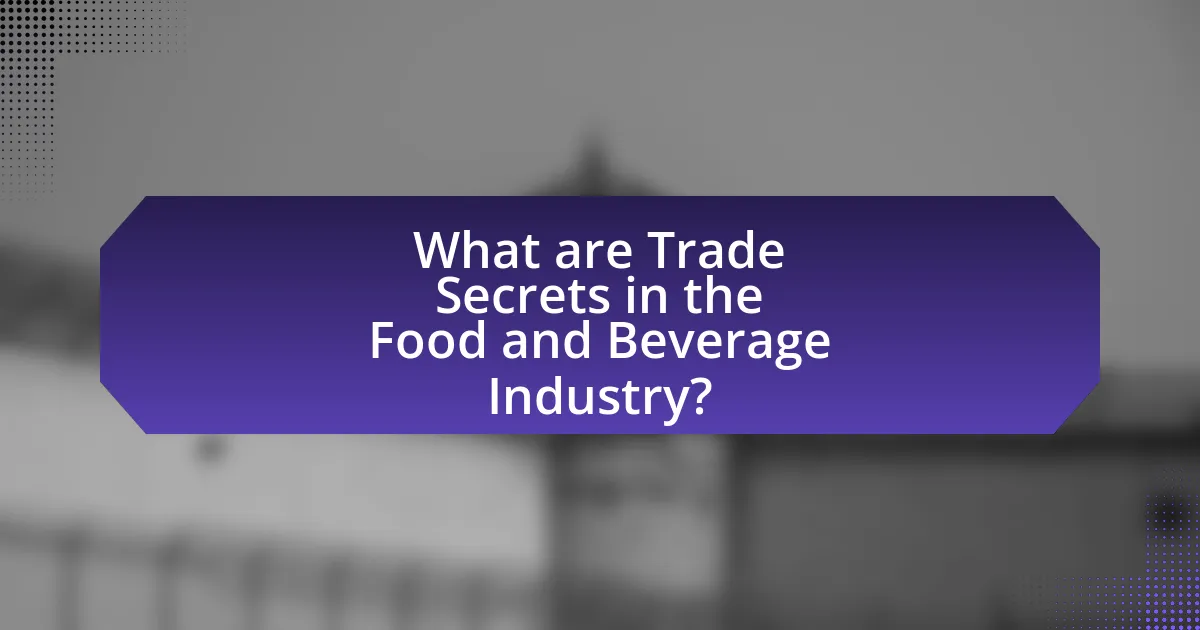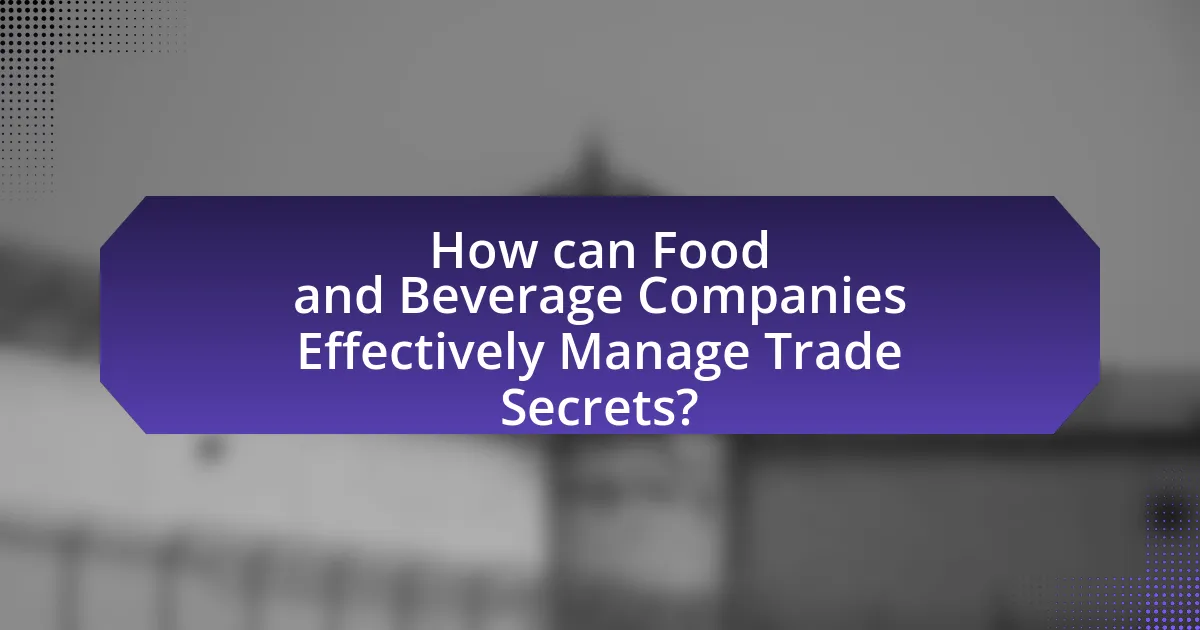Trade secrets in the food and beverage industry refer to confidential business information, such as recipes and processes, that provide a competitive advantage. This article explores the legal protections available for trade secrets, including the Uniform Trade Secrets Act and the Defend Trade Secrets Act, and highlights the differences between trade secrets, patents, and trademarks. It discusses the importance of trade secrets for innovation and market differentiation, the challenges companies face in maintaining confidentiality, and best practices for safeguarding proprietary information. Additionally, the article examines the consequences of trade secret misappropriation and the legal remedies available to affected companies.

What are Trade Secrets in the Food and Beverage Industry?
Trade secrets in the food and beverage industry are confidential business information that provides a competitive edge, such as recipes, formulas, processes, or methods. These secrets are protected under law as long as they are not publicly disclosed and reasonable efforts are made to maintain their secrecy. For example, the Coca-Cola formula is a well-known trade secret that has been safeguarded for over a century, illustrating the significance of such information in maintaining market advantage.
How are trade secrets defined within this industry?
Trade secrets in the food and beverage industry are defined as confidential business information that provides a competitive edge, including recipes, formulas, processes, and methods. These secrets are protected under law as long as they are not publicly known and reasonable efforts are made to maintain their secrecy. For instance, the Uniform Trade Secrets Act defines trade secrets as information that derives independent economic value from not being generally known and is subject to reasonable efforts to maintain its secrecy. This legal framework underscores the importance of confidentiality in preserving the unique aspects of food and beverage products, which can significantly influence market success.
What legal protections exist for trade secrets in food and beverage?
Legal protections for trade secrets in the food and beverage industry primarily stem from the Uniform Trade Secrets Act (UTSA) and the Defend Trade Secrets Act (DTSA) in the United States. These laws provide a framework for the protection of confidential business information that gives a competitive advantage, such as recipes, manufacturing processes, and marketing strategies. Under these statutes, trade secrets are protected as long as they are not publicly known and reasonable efforts are made to maintain their secrecy. For instance, the DTSA allows for civil remedies, including injunctions and monetary damages, for misappropriation of trade secrets, reinforcing the legal standing of such protections in the food and beverage sector.
How do trade secrets differ from patents and trademarks?
Trade secrets differ from patents and trademarks primarily in their protection mechanisms and duration. Trade secrets are confidential business information that provides a competitive edge and are protected as long as they remain secret, without formal registration. In contrast, patents require public disclosure of the invention and provide exclusive rights for a limited period, typically 20 years, after which the invention enters the public domain. Trademarks, on the other hand, protect symbols, names, or slogans used to identify goods or services and can last indefinitely as long as they are in use and properly renewed. This distinction highlights that trade secrets rely on secrecy for protection, while patents and trademarks involve formal registration and public disclosure.
Why are trade secrets important for food and beverage businesses?
Trade secrets are crucial for food and beverage businesses because they protect proprietary recipes, processes, and formulations that provide a competitive advantage. Maintaining confidentiality around these trade secrets allows companies to differentiate their products in a saturated market, thereby attracting and retaining customers. For instance, the Coca-Cola formula is a well-known trade secret that has contributed to the brand’s global success and market dominance. By safeguarding such information, businesses can prevent competitors from replicating their unique offerings, which is essential for sustaining profitability and market share.
What competitive advantages do trade secrets provide?
Trade secrets provide competitive advantages by allowing companies to protect proprietary information that gives them an edge over competitors. This protection enables businesses to maintain unique formulations, processes, or methods that are not publicly disclosed, thereby preventing competitors from replicating their success. For instance, the Coca-Cola formula is a well-known trade secret that has contributed to the brand’s market dominance for over a century. By safeguarding such information, companies can enhance their market position, foster customer loyalty, and achieve higher profit margins, as they can offer unique products that are not easily imitated.
How do trade secrets impact innovation in the industry?
Trade secrets significantly enhance innovation in the industry by providing companies with a competitive edge through the protection of proprietary information. This protection encourages investment in research and development, as firms can safeguard their unique processes, recipes, or technologies without the fear of imitation. For instance, the Coca-Cola formula, a closely guarded trade secret, has allowed the company to maintain its market dominance and continuously innovate its product offerings without revealing its competitive advantages. Additionally, a study by the National Bureau of Economic Research found that firms relying on trade secrets tend to invest more in innovation, leading to a higher rate of new product development and improved market performance.

What Unique Considerations Affect Trade Secrets in the Food and Beverage Industry?
Unique considerations affecting trade secrets in the food and beverage industry include the need for confidentiality in recipes, processes, and sourcing of ingredients. The industry often relies on proprietary formulations and methods that provide a competitive edge, making it crucial to protect these secrets from competitors. Additionally, the high turnover rate of employees in this sector increases the risk of trade secret misappropriation, as departing employees may take valuable knowledge to rival companies. Furthermore, regulatory compliance regarding food safety and labeling can complicate the protection of trade secrets, as companies must balance transparency with confidentiality. The importance of maintaining trade secrets is underscored by the fact that a single leaked recipe can significantly impact a brand’s market position and profitability.
How does the nature of food and beverage products influence trade secret protection?
The nature of food and beverage products significantly influences trade secret protection due to their unique formulations, processes, and consumer preferences. Food and beverage companies often rely on proprietary recipes, manufacturing techniques, and ingredient sourcing to differentiate their products in a competitive market. For instance, the Coca-Cola formula is famously protected as a trade secret, demonstrating how the specific composition of a beverage can be crucial for maintaining a competitive edge. Additionally, the perishability of food products necessitates swift innovation and adaptation, making the protection of trade secrets vital for sustaining market relevance. The U.S. Uniform Trade Secrets Act defines trade secrets as information that derives independent economic value from not being generally known, which aligns with the food and beverage industry’s reliance on unique product characteristics to secure consumer loyalty and market share.
What specific recipes or processes are commonly protected as trade secrets?
Specific recipes and processes commonly protected as trade secrets include the formulas for Coca-Cola, KFC’s blend of herbs and spices, and the process for making Tabasco sauce. These trade secrets are safeguarded to maintain competitive advantage and brand identity. For instance, Coca-Cola’s formula has been kept confidential since its creation in 1886, contributing to its iconic status and market dominance. Similarly, KFC’s secret recipe, known to only a few individuals, has been a key factor in its global success since 1940. The protection of these recipes and processes is crucial in the food and beverage industry, as they directly impact consumer perception and sales.
How do consumer preferences affect the value of trade secrets?
Consumer preferences significantly influence the value of trade secrets by determining the demand for products that rely on proprietary information. When consumers favor unique flavors, ingredients, or formulations, the trade secrets that protect these aspects become more valuable, as they provide a competitive edge in the market. For instance, a study by the Food and Beverage Industry Association found that brands with distinctive recipes or processes can command higher prices and customer loyalty, directly linking consumer preference to the economic worth of their trade secrets. Thus, as consumer tastes evolve, the strategic importance and financial value of trade secrets in the food and beverage sector are heightened.
What challenges do companies face in maintaining trade secrets?
Companies face significant challenges in maintaining trade secrets, primarily due to the risk of employee turnover and the potential for information leaks. High employee mobility in the food and beverage industry can lead to the inadvertent sharing of proprietary information, as departing employees may take knowledge to competitors. Additionally, the reliance on third-party suppliers and contractors increases the risk of exposure, as these external parties may not have the same level of commitment to confidentiality. Legal protections, such as non-disclosure agreements, can be difficult to enforce, especially in jurisdictions with varying laws regarding trade secrets. According to the Economic Espionage Act, trade secret theft can result in severe penalties, yet enforcement remains inconsistent, making it challenging for companies to safeguard their intellectual property effectively.
How can employee turnover impact trade secret security?
Employee turnover can significantly compromise trade secret security by increasing the risk of sensitive information leakage. When employees leave, especially those in key positions, they may take proprietary knowledge with them, either intentionally or unintentionally. A study by the Ponemon Institute found that 59% of employees who left their jobs took confidential information with them, highlighting the vulnerability of organizations during turnover. Additionally, high turnover rates can lead to inadequate training for new employees, resulting in unintentional breaches of trade secret protocols. This combination of knowledge transfer and insufficient security measures can severely undermine the protection of trade secrets in the food and beverage industry.
What role does technology play in protecting trade secrets?
Technology plays a crucial role in protecting trade secrets by implementing advanced security measures that safeguard sensitive information. These measures include encryption, access controls, and secure communication channels, which prevent unauthorized access and data breaches. For instance, encryption algorithms can protect proprietary recipes and formulations from being intercepted during transmission. Additionally, access controls ensure that only authorized personnel can view or modify sensitive data, thereby reducing the risk of internal leaks. According to a report by the Ponemon Institute, 60% of data breaches are caused by insider threats, highlighting the importance of technology in mitigating such risks. Overall, technology serves as a vital defense mechanism in maintaining the confidentiality of trade secrets in the food and beverage industry.

How can Food and Beverage Companies Effectively Manage Trade Secrets?
Food and beverage companies can effectively manage trade secrets by implementing robust confidentiality agreements, conducting regular employee training, and establishing secure information systems. Confidentiality agreements legally bind employees and partners to protect proprietary information, reducing the risk of unauthorized disclosure. Regular training ensures that employees understand the importance of trade secrets and the protocols for handling sensitive information. Additionally, secure information systems, including encryption and access controls, safeguard trade secrets from external threats and internal breaches. According to the U.S. Department of Commerce, companies that actively protect their trade secrets can enhance their competitive advantage and innovation, demonstrating the effectiveness of these management strategies.
What best practices should companies implement to safeguard trade secrets?
Companies should implement strict access controls, confidentiality agreements, and employee training to safeguard trade secrets. Access controls limit who can view sensitive information, ensuring that only authorized personnel have access. Confidentiality agreements legally bind employees and partners to protect proprietary information, reducing the risk of unauthorized disclosure. Employee training educates staff on the importance of trade secrets and the protocols for handling sensitive data, fostering a culture of security. According to the Economic Espionage Act, trade secret theft can lead to significant legal consequences, emphasizing the need for robust protective measures.
How can training and policies enhance trade secret protection?
Training and policies enhance trade secret protection by establishing clear guidelines and protocols that employees must follow to safeguard sensitive information. Effective training programs educate employees about the importance of trade secrets, the legal implications of disclosure, and the specific measures they should take to protect proprietary information. For instance, a study by the Association for Corporate Counsel found that organizations with comprehensive training on trade secret protection experience a 30% reduction in incidents of unauthorized disclosure. Additionally, well-defined policies create a structured environment where employees understand their responsibilities and the consequences of failing to protect trade secrets, thereby fostering a culture of confidentiality and compliance.
What measures can be taken to prevent unauthorized disclosure?
To prevent unauthorized disclosure of trade secrets in the food and beverage industry, companies should implement robust confidentiality agreements and employee training programs. Confidentiality agreements legally bind employees and partners to protect sensitive information, while training programs educate staff on the importance of safeguarding trade secrets and the potential consequences of breaches. According to a study by the Economic Espionage Act, companies that enforce such measures significantly reduce the risk of information leaks, demonstrating the effectiveness of these strategies in maintaining competitive advantage.
What are the consequences of trade secret misappropriation?
The consequences of trade secret misappropriation include legal liability, financial damages, and loss of competitive advantage. Companies that misappropriate trade secrets may face lawsuits, resulting in significant monetary penalties, which can reach millions of dollars depending on the severity of the infringement. For instance, the Economic Espionage Act of 1996 allows for criminal penalties, including fines and imprisonment for individuals involved in the theft of trade secrets. Additionally, the affected party may seek injunctive relief to prevent further use or disclosure of the misappropriated information, further impacting the offending company’s operations. The loss of proprietary information can also lead to diminished market position and reduced profitability, as competitors gain access to valuable insights that were previously protected.
How can companies respond to trade secret theft or breaches?
Companies can respond to trade secret theft or breaches by implementing immediate legal action, such as filing for injunctions or pursuing damages through litigation. This response is crucial as it helps to prevent further unauthorized use of the trade secrets and holds the offending party accountable. According to the Economic Espionage Act, trade secret theft can lead to severe penalties, including fines and imprisonment, which underscores the legal framework available for companies to protect their intellectual property. Additionally, companies should conduct internal investigations to assess the extent of the breach and reinforce security measures to prevent future incidents. Implementing employee training on confidentiality and establishing clear protocols for handling sensitive information can further mitigate risks associated with trade secret theft.
What legal remedies are available for trade secret violations?
Legal remedies available for trade secret violations include injunctive relief, monetary damages, and attorney’s fees. Injunctive relief allows a court to prohibit further use or disclosure of the trade secret, effectively protecting the owner’s interests. Monetary damages can be awarded to compensate for losses incurred due to the violation, which may include lost profits or unjust enrichment of the violator. Additionally, courts may award attorney’s fees to the prevailing party in cases where the violation was willful and malicious, as outlined in the Uniform Trade Secrets Act. These remedies are designed to deter future violations and provide restitution to the aggrieved party.
What practical tips can food and beverage companies follow to protect their trade secrets?
Food and beverage companies can protect their trade secrets by implementing strict confidentiality agreements with employees and partners. These agreements legally bind individuals to maintain secrecy regarding proprietary information, reducing the risk of unauthorized disclosure. Additionally, companies should limit access to sensitive information on a need-to-know basis, ensuring that only essential personnel have knowledge of trade secrets.
Regular training on the importance of trade secret protection can further reinforce a culture of confidentiality within the organization. Moreover, employing physical security measures, such as locked storage for sensitive documents and secure digital systems for electronic data, enhances protection against theft or accidental exposure.
According to the Economic Espionage Act of 1996, trade secret theft can lead to severe legal consequences, emphasizing the importance of safeguarding proprietary information. By following these practical tips, food and beverage companies can significantly mitigate the risk of losing their competitive advantage through trade secret misappropriation.



